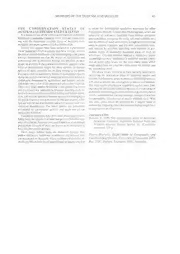
The conservation status of Australian freshwater crayfish PDF
Preview The conservation status of Australian freshwater crayfish
MEMOIRS OF THE QUEENSLAND MUSEUM 95 THE CONSERVATION STATUS OF to create the microhabitat conditions necessary for other AUSTRALIAN FRESHWATER CRAYFISH crustaceans, include: i) caves and mound springs, which are Ina recent review of the conservation status of Australian subjected to pressures resulting from habitat alteration freshwater crustaceans (Horwitz 1990), relevant issues deal- (eutrophication, trampling by cattle, off-road vehicles etc.) ing with the freshwater crayfish fauna of Australia were and the effects of water drawdown; ii) highland rainforested included; this paper summarises that information. areas in eastern Australia; and iii) other subterranean habi- Twenly five species have been included in a provisional tals, crealed by crayfish, including their burrows in per- list of threatened crayfish species and these include; i) three manent water. in seasonally inundated areas, or even on species of smooth freshwater crayfish belonging to the genus hill-slopes. Crayfish burrows harbour a distinctive faunal Cherax, indications are that the impact of aquaculture and assemblage (termed <pholeteros9); pollution and the allera- commercial and recreational fishing has resulted. or may tion of water table levels are the most likely areas which result. in declines in the population numbers, genetic varia~ might affect both the crayfish which create the habitat, and bility or distributional ranges for these species. ii) thirteen the assemblage itself. species of spiny crayfish: ten of these belong to the genus The above issues would be al least partially resolved by Euastacus and are confined to highland rainforested regions improving the reservahon status of identified species and along the eastern seaboard of Australia where their habitat is habitats. Furthermore. as we increase our knowledge base we continually (hreatened by agricultural and forestry activity will need to modify the status given Lo species and habitats. and where only a few of the species are adequately reserved, The most urgent information required to update these find- Three very large species belonging to the genera Euustacus ings must be the precise effects on species of a wide range of and Astacopsis are subjected tw pressure resulting from et- potentially (hrealening processes (effofe pecstticisdes , heavy fectively unrestrained recreational fishing and habitat altera- metals, sedimentation, swamp drainage. changes in nutrient tion: and iii) nine species of burrowing crayfish belonging to concentrations, introduction of exotic diseases etc), With the genus Engaeus; this genus can be characterised by a few this data, status could be reviewed on a regular basis to species with broad distributions and many species with very restricted distributions, The listed species are potentially remove any impeding effect that outdated listings mighl have on appropriate developments. threatened by agricultural activity and again not all are adequately reserved. Taxonomic problems have prevented proper assessments Literature Cited being made for species in al least four genera (Tenuibranchi- Horwitz, P. 1990. The conservation status of Australian urus, Geocherax, Parastacoides and Engaewa). even though freshwater Crustacea, Australian National Parks and Wildlife Service Report Series I4. (Canberra: populations for each of these are known ty be threatened or have become extinct already. Australia). 121 p . Three major habitat types are important because they Pierre Horwitz, Department of Geography and harbor distinctive freshwater crustaceans and because they are threatened in Australia, These habitats which either in- Environmental Studies, University of Tasmania, GPQ clude crayfish in their faunal assemblages or require crayfish Box 252C, Hobart, Tasmania 7001, Australia.
